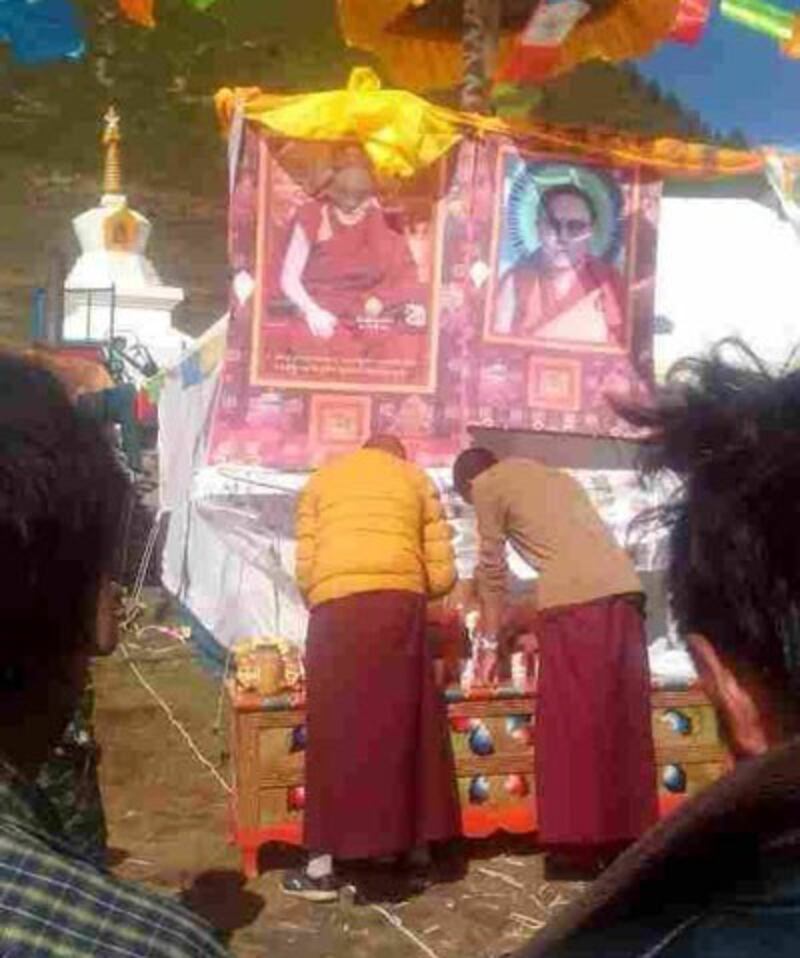Tibetan villagers in China’s Sichuan province gathered in prayer this week to call for the release of Tenzin Delek Rinpoche, a popular Buddhist monk now serving a life term in prison following what rights groups and supporters have described as a wrongful conviction on a bombing charge.
The event on Sunday was organized by villagers belonging to the Golok township of Lithang (in Chinese, Litang) county in the Kardze (Ganzi) Tibetan Autonomous Prefecture, a Tibetan monk living in exile told RFA’s Tibetan Service on Tuesday.
“Residents gathered at a site containing prayer flags and stupas and displayed two huge photos, one of [exiled spiritual leader] the Dalai Lama and the other of Tenzin Delek Rinpoche, and made offerings and prayed for Rinpoche’s release,” the India-based monk named Loga said, citing local contacts.
“Remembering Rinpoche’s kindness toward the people, many of the participants broke down in tears when speakers at the gathering described how Rinpoche had been wrongfully accused and sentenced,” Loga said.
He described the gathering as "large," without specifying how many people had attended. Photos indicate dozens of villagers were present.
Speakers at the event openly blamed former top Chinese security chief Zhou Yongkang—now among top ruling Chinese Communist Party officials being investigated for corruption—and local county, prefecture, and provincial-level officials for Rinpoche’s ordeal, he added.
Local Chinese authorities were “aware of the event,” which is now observed annually, but did not intervene, Loga said.

Death sentence commuted
Charged with involvement in an April 3, 2002 bombing in the central square of Sichuan’s capital Chengdu, Tenzin Delek Rinpoche, now 64, was initially sentenced to death in December 2002 along with an assistant, Lobsang Dondrub.
His death sentence was later commuted to life imprisonment, but Lobsang Dondrub was executed almost immediately, prompting an outcry from rights activists who questioned the fairness of the trial.
New York-based Human Rights Watch (HRW) concluded in a report two years after the trial that the legal proceedings against Tenzin Delek Rinpoche had been “procedurally flawed” and that he was charged only in order to “curb his efforts to foster Tibetan Buddhism … and his work to develop Tibetan social and cultural institutions.”
Authorities had begun to perceive Tenzin Delek Rinpoche as a threat as his “local status rose and he successfully challenged official policies on a number of issues,” HRW said in its report.
“Many protests have been launched over the years to call for Rinpoche’s release,” Loga told RFA.
He recalled that in 2009, 70 Tibetans had laid down on the highway at Golok township’s Nyishi village in Lithang to demand that Tenzin Delek Rinpoche be freed.
The protest continued for five days and then spread to other areas, including Tenzin Delek Rinpoche’s home county of Nyagchukha (in Chinese, Yajiang), Loga said, adding, “Over 5,000 to 6,000 Tibetans took part.”
The protests prompted a huge influx of Chinese security forces into Nyagchukha and Lithang ahead of a major annual horse-racing festival, a site of previous unrest, sources reported at the time.
Sporadic demonstrations challenging Chinese rule have continued in Tibetan-populated areas of China since widespread protests swept the region in 2008, with 133 Tibetans to date setting themselves ablaze to oppose Beijing's rule and call for the Dalai Lama's return.
Reported by Lhuboom and by Yangdon Demo for RFA's Tibetan Service. Translated by Karma Dorjee. Written in English by Richard Finney.
